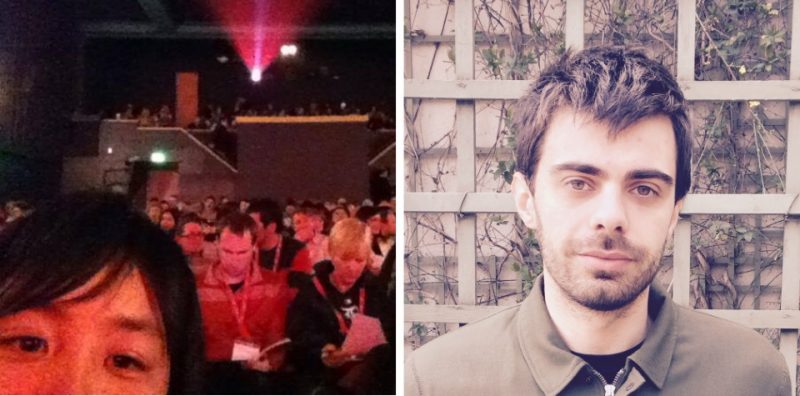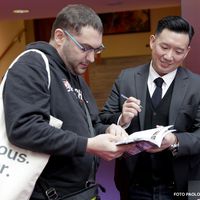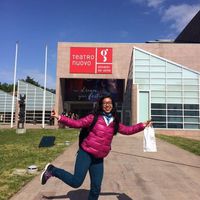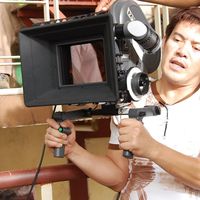FEFF Campus | A conversation between French and Japanese Cinephiles
 Contributed by Andy SELLITTO and Kenta KATO
Contributed by Andy SELLITTO and Kenta KATOTen young journalists from Asia and Europe were selected to take part in the FEFF Campus programme at the 18th edition of Far East Film Festival in Udine, Italy, in April 2016.
With the support of Asia-Europe Foundation (ASEF), the project offered them a first-hand experience of the festival and all it offers – from interviews with the guests, to the panel discussions and, of course, all the films on offer over the course of its nine-day run.
The Campus saw French writer Andy SELLITTO and Japanese student Kenta KATO sharing a room together, arguing every night about films and other topics.
In this casual chat at the end of the festival, they share their opinions on film, the festival … and on each other.

Kenta: Hello. My name is Kenta KATO from Tokyo. I was one of members of the Campus programme at this year’s FEFF. I’ve been majoring in film studies at university, while also working at a film festival as a programmer, and doing a little bit of film writing as well. Can you tell me a little bit of your background, Andy?
Andy: I’m from France. I studied literature and journalism and I completed an internship in a French cinema as an online editor. I'm currently writing very different content as a freelance writer, including films reviews for a French magazine. I really like reading cinema magazines, especially Cahiers du Cinema because I think their taste and their vision of cinema are often the same as mine.
Kenta: In terms of cinema in France and Japan, the biggest argument we have to sort out at the beginning is the topic of Kiyoshi KUROSAWA or Naomi KAWASE who are very popular in small parts of France, but not really in Japan. So, first of all, will you talk a little bit about those filmmakers and why their films appeal to French audiences?
Andy: I think that there are filmmakers everywhere who are famous in their native countries but not at all worldwide. And filmmakers who are not popular at home can be really famous abroad. Kurosawa is one of them. For me, he is really good at making genre films – thrillers, horror movies - which are far deeper and interesting than classical genre films. He always uses the genre as a way to tell us about cinema, society, and life. For instance, there are many ghosts in his films which tell a lot about the living beings themselves, about all the emotions they can feel, all the issues they have to deal with, such as death or loneliness. I guess that’s why French people like him. And I don’t know why he’s not popular in Japan. Perhaps you can tell me about that?
Kenta: I love films like Cure (1997), and I do agree that he uses genre to introduce a lot of interesting ideas about life. But what I feel about Kiyoshi KUROSAWA is that his thematic interests do not lead to memorable characters and narratives. His films exist merely because of ideas, and individuals and plots are flat and artificial, not emotional, working just as a means to convey main points. And he’s running out of ideas. I felt Creepy (2016) was a degraded version of Cure - without an intellectual core. His films are bad genre films that cannot even work as entertainment.
Andy: I think that he just does not try to make his films attractive. And I find this impressive. I really like filmmakers who do not aim at manipulating the spectators; making them feel sad or angry, making them pity the characters. And even though his films are not attractive, they tell us precious stories about life and about ourselves. It is the same for Naomi KAWASE. Some filmmakers are often not popular in their native country. I feel that French people don’t really like a kind of unattractive French cinema. I think that there are many filmmakers who are better understood abroad.
Kenta: I feel Cahiers du Cinema has distinctive taste in cinema that is quite different from other regions. For example last year’s best film by Cahiers du Cinema was Nanni MORETTI’s Mia Madre (2015). What do you think of the film? Do you think it deserves to be named the best film from last year?
Andy: I love Mia Madre. For me it’s one of the best films released last year about death. How do you react when someone from your close family is about to die? How do you deal with it? I like the fact that the two characters, the brother and the sister, react differently to the situation. The man tends to give up everything. And the woman tries to deal with it, to keep on living even though she is really depressed. I think it’s a really subtle film. Never too much. You will not cry. It’s really moving, but the emotion grabs you at the very end of the film. Before that, Nanni MORETTI does not want to make people cry. He does not try to give people what they might expect from this kind of film.
Kenta: I don’t really like Mia Madre. Part of the story of - the relationship they had with the dying mother – didn’t really have the characters interacting. I got quite sick of the caricatured image of an arrogant actor, played by John TURTURRO. His episodes were really redundant and not funny. I could see the subtlety about death and I can say it was realistic depiction of death. That’s great. But still you have to build up the narrative, and Moretti failed to create an emotional arc. That can be rhetorically described as subtlety, but it doesn’t necessarily mean a positive thing. Something like Amour (2012) by Michael HANEKE was a much better film about love and death.
Andy: I can’t disagree more. Because, for me, Amour is the perfect example of a manipulative film. It’s not a film about love, it’s a film about desperation. A naturalist film about what you may feel when the person you love is about to die and cannot do anything by herself. You can be led to hate this person or want her to die. Okay, why not. But what really bothers me is the fact that Haneke wants us to believe that the final act of the character is an act of love, while it is just an act of despair. I really hate this film because it is a film about despair which pretends to be a film about love. And Mia Madre is really a film about love.
Kenta: In terms of the Far East Film Festival this year, was there any film that you particularly remember?
Andy: One of the films that I really liked was House (1977). It is crazy, really funny, and there is something impressive and clever. I guess we can find many references to several types of cinema. And the staging of the film is great, too. There are so many elements that can be seen. I think if you watch the film again and again and again, you will see a very different film because you won’t focus on the same aspects.
Kenta: I agree with you about this one – finally! It was the second time I’ve watched House, and it was really great that I could watch it on the big screen. Of course I understand that it’s a technically amazing film with such a crazy combination of editing and analogue filmmaking. But I really felt some deep themes this time, like how a self-reflection can present a scary side of ourselves, one that can kill people or attack somebody. On the surface, it seems quite a sexist idol movie, and we might enjoy watching main characters almost raped by a piano, but actually those sexual images are really important aspects of the film, because it is a movie about woman who couldn’t get married because of the war.
Andy, in terms of a European audience, what significance do you think a festival such as FEFF has – one that is European but deals with Asian cinema?
Andy: I think it’s great because at international film festivals there are many Asian films, but they are usually made by some independent filmmakers like Kurosawa or Kawase that are famous abroad.
This festival is really interesting because it enables a European audience to watch films that are quite popular in Japan, China, Korea. Europeans are not used to watching those kinds of films and this festival gives them an opportunity to see those films that might not be released in Italy or in France.
Kenta: As an Asian participant, I do think this festival is really important especially for Japanese commercial films, which don’t really get international attention. It’s really interesting to see how Western audiences think about them, which can be really different from Asian points of view on movies. Another thing is that Japanese films don’t have a lot of press coverage in English, which is really a pity. Even if non-Asian spectators want to know about Japanese cinema, there are only a few articles to read. This kind of film festival gives opportunities for Asian films to get a chance to be recognized internationally.
Andy: For me, being part of this Campus was a great experience which gave us the opportunity to improve our writing skills, meet professionals and talk about cinema and many other matters with nine other students around our age with different backgrounds and cultures. What did you think about that experience?
Kenta: This Campus project was really great especially because we had five participants from Asia and five from Europe, so there were cultural exchanges between us. I shared a room with a Cahiers du Cinema guy from Paris. It was really interesting to see how his opinions about films are so different. What did you feel about sharing a room with a Japanese student?
Andy: I’m really glad that I could share a room with a Japanese guy. One of the most interesting aspects in this kind of festival is that Europeans and Japanese can meet each other and exchange about cinema and their view of the film industry, of society, life and everything. It was funny to see that we did not have the same view about cinema, about filmmakers. We had really long fights about some films like The Grand Budapest Hotel (2014) and it was great because it made us try to be open-minded. And despite our passionate arguments about cinema, I feel that we became really good friends!
Kenta: I don’t want to generalise and say that you are the best representative of a French person, and what you have done during the festival is exactly what French people are doing in Paris. But it was nice to see how someone from a totally different culture, country and background has different views. Of course there were a few surprising things like taking a shower five minutes before going out. Good thing about sharing a room is that we can talk a lot before going to bed. We could share this very important time to talk about totally different opinions about many kinds of topics. I really appreciate my time at Udine, which gave me a chance to know other cultures.
Stay tuned for more stories from the FEFF Campus participants!
https://culture360.asef.org/asef-news/asef-culture360-supports-far-east-film-festival-campus-2016-udine-italy/
http://www.fareastfilm.com/
http://www.fareastfilm.com/easyne2/campus.aspx
Similar content
By Kerrine Goh
02 Jun 2016
By Kerrine Goh
06 Jun 2016
By Kerrine Goh
12 Feb 2012
By Kerrine Goh
30 Nov 2011





